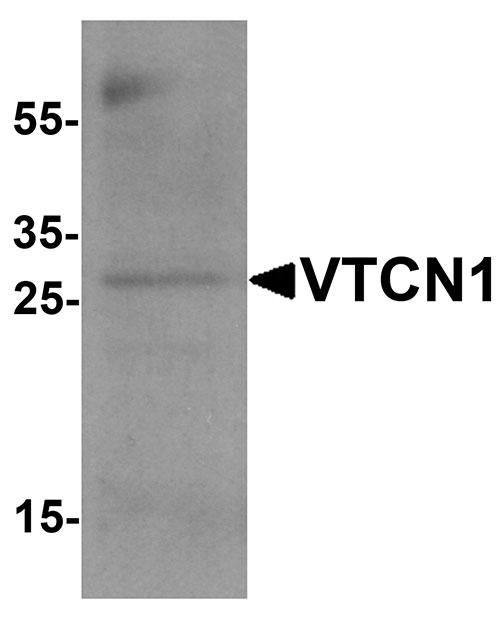VTCN1 Antibody
- SPECIFICATION
- CITATIONS
- PROTOCOLS
- BACKGROUND

Application
| WB, E |
|---|---|
| Primary Accession | Q7Z7D3 |
| Other Accession | NP_078902, 99028881 |
| Reactivity | Human, Mouse |
| Host | Rabbit |
| Clonality | Polyclonal |
| Isotype | IgG |
| Calculated MW | Predicted: 31 kDa |
| Application Notes | VTCN1 antibody can be used for detection of VTCN1 by Western blot at 1 - 2 µg/mL. |
| Gene ID | 79679 |
|---|---|
| Target/Specificity | VTCN1; |
| Reconstitution & Storage | VTCN1 antibody can be stored at 4℃ for three months and -20℃, stable for up to one year. |
| Precautions | VTCN1 Antibody is for research use only and not for use in diagnostic or therapeutic procedures. |
| Name | VTCN1 {ECO:0000312|EMBL:EAW56672.1} |
|---|---|
| Function | Negatively regulates T-cell-mediated immune response by inhibiting T-cell activation, proliferation, cytokine production and development of cytotoxicity. When expressed on the cell surface of tumor macrophages, plays an important role, together with regulatory T- cells (Treg), in the suppression of tumor-associated antigen-specific T-cell immunity. Involved in promoting epithelial cell transformation. |
| Cellular Location | Cell membrane; Single-pass type I membrane protein. Note=Expressed at the cell surface. A soluble form has also been detected. {ECO:0000255, ECO:0000269|PubMed:12818165, ECO:0000269|PubMed:15878339, ECO:0000269|PubMed:16782226} |
| Tissue Location | Overexpressed in breast, ovarian, endometrial, renal cell (RCC) and non-small-cell lung cancers (NSCLC). Expressed on activated T- and B-cells, monocytes and dendritic cells, but not expressed in most normal tissues (at protein level). Widely expressed, including in kidney, liver, lung, ovary, placenta, spleen and testis |

Thousands of laboratories across the world have published research that depended on the performance of antibodies from Abcepta to advance their research. Check out links to articles that cite our products in major peer-reviewed journals, organized by research category.
info@abcepta.com, and receive a free "I Love Antibodies" mug.
Provided below are standard protocols that you may find useful for product applications.
Background
VTCN1 Antibody: T cell immunity plays a critical role in host immune surveillance of tumour cell growth and metastatic spread. VTCN1, also known as B7-H4, is a member of the B7 family of immune regulatory molecules. Expressed primarily on the membrane of lymphoid cells, VTCN1 is an immunoinhibitory protein that interacts with receptors on the surface of T lymphocytes, thus mediating cellular and humoral immune responses. Overexpression of VTCN1 is associated with certain malignancies, including ovarian and breast cancer, which may be a mechanism by which tumour cells suppress T cell immunity and facilitate tumour progression. VTCN1 may thus be a useful biomarker for the early detection of ovarian cancer.
References
Flies DB and Chen L. The new B7s: playing a pivotal role in tumor immunity. J. Immunother. 2007; 30:251-60.
Sica GL, Choi IH, Zhu G, et al. B7-H4, a molecule of the B7 family, negatively regulates T cell immunity. Immunity 2003; 18:849-61
Zang X, Loke P, Kim J, et al. B7x: a widely expressed B7 family member that inhibits T cell activation. Proc. Natl. Acad. Sci. USA 2003; 100:10388 - 92.
Salceda S, Tang T, Kmet M, et al. The immunomodulatory protein B7-H4 is overexpressed in breast and ovarian cancers and promotes epithelial cell transformation. Exp. Cell Res. 2005; 306:128-41.
If you have used an Abcepta product and would like to share how it has performed, please click on the "Submit Review" button and provide the requested information. Our staff will examine and post your review and contact you if needed.
If you have any additional inquiries please email technical services at tech@abcepta.com.













 Foundational characteristics of cancer include proliferation, angiogenesis, migration, evasion of apoptosis, and cellular immortality. Find key markers for these cellular processes and antibodies to detect them.
Foundational characteristics of cancer include proliferation, angiogenesis, migration, evasion of apoptosis, and cellular immortality. Find key markers for these cellular processes and antibodies to detect them. The SUMOplot™ Analysis Program predicts and scores sumoylation sites in your protein. SUMOylation is a post-translational modification involved in various cellular processes, such as nuclear-cytosolic transport, transcriptional regulation, apoptosis, protein stability, response to stress, and progression through the cell cycle.
The SUMOplot™ Analysis Program predicts and scores sumoylation sites in your protein. SUMOylation is a post-translational modification involved in various cellular processes, such as nuclear-cytosolic transport, transcriptional regulation, apoptosis, protein stability, response to stress, and progression through the cell cycle. The Autophagy Receptor Motif Plotter predicts and scores autophagy receptor binding sites in your protein. Identifying proteins connected to this pathway is critical to understanding the role of autophagy in physiological as well as pathological processes such as development, differentiation, neurodegenerative diseases, stress, infection, and cancer.
The Autophagy Receptor Motif Plotter predicts and scores autophagy receptor binding sites in your protein. Identifying proteins connected to this pathway is critical to understanding the role of autophagy in physiological as well as pathological processes such as development, differentiation, neurodegenerative diseases, stress, infection, and cancer.


